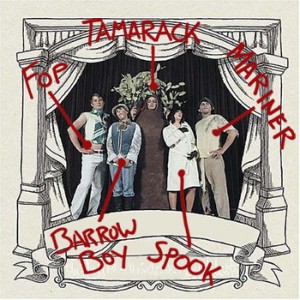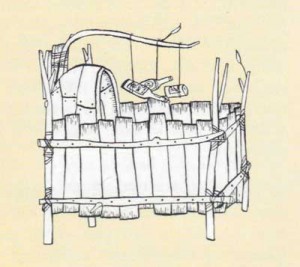The Annotated Decemberists No. 11: Odalisque
 Perhaps no band’s lyrics better lend themselves to pseudo-academic analysis than those of The Decemberists. The Annotated Decemberists is an attempt to puzzle through the Portland, Oregon, group’s entire catalog song by song—examining all the obscure vocabulary, historical references and poetic subtext—or go crazy trying.
Perhaps no band’s lyrics better lend themselves to pseudo-academic analysis than those of The Decemberists. The Annotated Decemberists is an attempt to puzzle through the Portland, Oregon, group’s entire catalog song by song—examining all the obscure vocabulary, historical references and poetic subtext—or go crazy trying.
As we shall see, from the title, we can gather that this is a song about a concubine, or at least a woman treated like a metaphorical concubine. Few other clear details are provided. There are indications that the woman understandably does not appreciate her status as a sex slave, and that she came to her station by way of being born into ramshackle poverty. Her situation does not improve by the end of the song. It is a more serious, consequential and therefore less problematic take on a subject explored in the album’s previous song, “A Cautionary Song.” Musically, it is also the first indication that the band was capable of some epic prog-rock, the sort that The Decemberists would begin to really explore on The Crane Wife.
They’ve come to find you, odalisque[1]
As the light dies horribly[2]
On a fire escape[3] you walk
All rare and resolved to drop

And when they find you, odalisque
They will rend[4] you terribly
Stitch from stitch ’til all
Your linen limbs[5] will fall
Lazy lady
Had a baby girl
And a sweet sound it made
Raised on pradies[6]
Peanut shells and dirt
In the railroad cul-de-sac[7]
And what do we do
With ten baby shoes
A kit bag[8] full of marbles
And a broken billiard cue?
What do we do?

Fifteen stitches
Will mend those britches[9] right
And then rip them down again
Sapling switches
Will rend those rags all right
What a sweet sound[10] it makes
And what do we do
With ten dirty Jews[11]
A thirty-ought[12] full of rock salt
And a warm afternoon?
What do we do?
Lay your belly under mine
Naked under me, under me
Such a filthy dimming shine[13]
The way you kick and scream[14]
And what we do
With ten baby shoes
A kit bag full of marbles
And a broken billiard cue?
What do we do?
Lazy lady
Had a baby girl
And a sweet sound it made
- “odalisque n. 1 a female slave 2 a concubine in a harem.” A French appropriation of the Turkish term for chambermaid, odalik. In practice, an odalik was a low-ranking member of the harem’s pecking order, an attendant to other women, but in the West, the word became associated with the concubines themselves. In particular, it was used to describe a specific genre of 19th century paintings that depict exotic, nude, reclining women, part of the Orientalism movement that romanticized and fetishized all things Eastern.↑
- The liner notes for Castaways and Cutouts have this as “terribly,” but Melloy is clearly singing “horribly.” The opposite exchange of words happens in the second line of the second verse.↑
- Fire escapes are sometimes used in dramatic literature as symbols of yearning for literal escape from the burning frustration of life’s circumstances and obligations, as in The Glass Menagerie or West Side Story. In the next line, the concubine seems to be considering a rather permanent escape from her circumstances via gravity.↑
- “rend v. 1 tear (something) into two or more pieces 2 cause great emotional pain to (a person or their heart).”↑
- The concubine is presented as an actual doll —a plaything that her cruel owners can tear apart.↑
- In the liner notes, this word is spelled with a D, but it is most likely a misspelling of praties, an Irish term for potatoes. See the folk songs “The Garden Where the Praties Grow” and “The Praties They Grow Small,” the latter of which is about the Irish Potato Famine.↑
- I’m going to assume this doesn’t mean a dead-end railroad track but instead means a residential street that became a dead end when a railroad line was built through it. It’s therefore likely a noisy place to grow up, and the property values aren’t what they used to be.↑
- “kit bag n. 1 knapsack.”↑
- Alteration of breeches, i.e. trousers.↑
- “Stitches,” “rend” and “sweet sound” in this stanza are all callbacks to earlier moments in the song. It wasn’t that long ago. You probably remember without me bringing it to your attention. Oh well.↑
- Whoa. This line is a bit of a shock, isn’t it? Before we go throwing around accusations of antisemitism, let’s remember that this song has a narrator, and this line is a sudden, dramatic indication of the quality of his character.↑
- In 1906, Springfield Armory introduced a 0.3-inch diameter rifle cartridge that became commonly known as the .30-06, or “thirty aught six.” These were the primary bullets used by U.S. military rifles and machine guns through the entire first half of the 20th century, and they remain a popular option for hunters. Now, my knowledge of firearms is limited at best —in fact, I wouldn’t be the least bit surprised if I got a detail wrong or used an awkward phrasing somewhere in those last two sentences that betrayed my sheer ignorance—but I do know this: You load shotgun cartridges with rock salt, not rifles. (At least I’m pretty sure, based on 30 minutes of research and a few Tarantino movies.) As somebody born and raised in Montana, Colin Meloy should know this better than I.↑
- A bit of an oxymoron, no?↑
- And here is our confirmation that the narrator is, in fact, an awful person.↑
Odalisque is also an important theme in many of JO Incandenza’s films in Infinite Jest, innit?